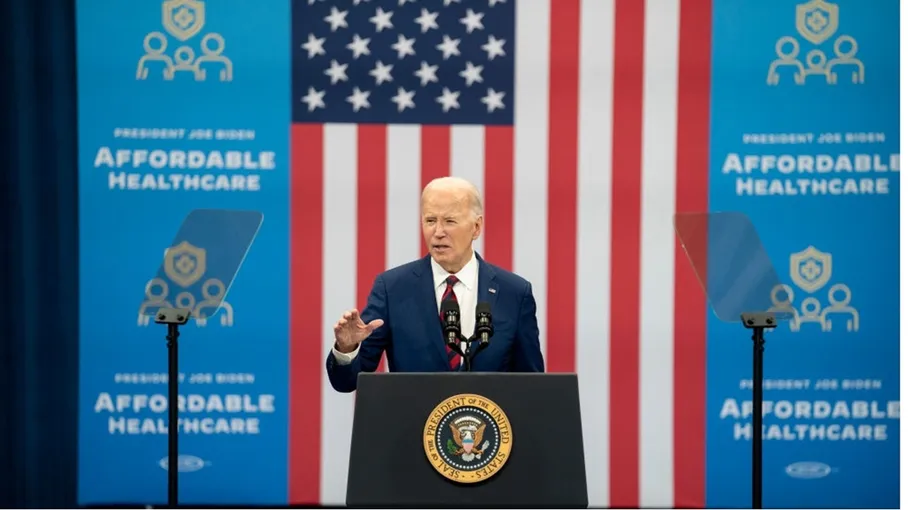What Do Biden’s New Tariffs on China Mean?

Abandoning globalization could have negative geopolitical impacts.
In a recent interview with Foreign Policy magazine, Ngozi Okonjo-Iweala, the Director-General of the World Trade Organization, articulated her concerns over the escalating protectionist measures, particularly the Biden administration’s recent imposition of a 100% tariff on Chinese electric vehicles.
Okonjo-Iweala underscored the potential repercussions of such policies on global trade, cautioning against the fragmentation that could ensue, potentially eroding up to 5% of the real global GDP, disproportionately affecting developing nations.
Okonjo-Iweala elucidated the WTO’s operational dynamics, which hinge significantly on member conduct. She highlighted the organization’s mechanisms for dispute resolution, emphasizing the availability of forums and committees dedicated to addressing grievances among members.
Globalization Trembling
Addressing criticisms of the WTO’s protracted dispute resolution process and the current non-operational status of the Appellate Body, Okonjo-Iweala acknowledged the validity of these concerns.
Currently, there are ongoing reforms aimed at expediting and enhancing responsiveness within the system, with a target of completion by year’s end.
Regarding the enforcement of trade rules, the WTO acts as the custodian of global trade agreements, ensuring stability, openness, and predictability. Members can seek redress from the WTO when they perceive rule violations.
Despite the operational challenges faced by the WTO’s appellate body, the dispute settlement system remains functional, with nine active cases currently under consideration.
Okonjo-Iweala delved into the broader implications of recent financial crises and the pandemic on globalization, saying that the perceived retreat from globalization might be overstated, attributing the sentiment to vulnerabilities exposed in global supply chains during the pandemic.
She advocated for diversification and decentralization of supply chains to mitigate over-reliance on specific sectors and regions.
The resilience of trade throughout these crises is vital for its role in fostering interdependence, which has yielded benefits for both developed and developing countries alike.
The discourse on the decline of globalization could partly reflect resistance to the shifting balance of power away from Western hegemony.

Inequality
The uneven distribution leaves certain impoverished regions within affluent countries and several poorer nations not reaping their full advantages.
Abandoning globalization could have negative geopolitical impacts; instead, a reimagined approach that extends its benefits to those previously marginalized by global trade is needed.
A shift in discourse from deglobalization to re-globalization could be implemented, raising the potential to enhance supply chain resilience.
This approach would involve diversifying supply chains to include countries and regions left behind in the initial wave of globalization, thereby fostering economic inclusion.
Countries rich in essential resources and minerals should develop comprehensive supply chains, not merely focusing on extraction and exportation.
By doing so, these countries could generate employment, add value locally, and integrate more fully into the global trade system, contributing to a more inclusive form of globalization.
Regarding the geopolitical tension between the United States and China, despite the competitive stance adopted by the U.S., re-globalization is progressing independently, with companies diversifying their operations into countries like Morocco, Bangladesh, and Costa Rica.
The world splitting into two major trading blocs aligned with either the U.S. or China would be detrimental to all nations, developed and developing alike.
The WTO is closely monitoring these developments, hoping to avoid further deterioration in U.S.-China relations.
Electric vehicles currently make up a mere 2 percent of the U.S. market, and tariff-imposed goods represent only about 7% of the 2023 trade between the two countries.
If these measures remain limited in scope, progress may be possible. However, there is apprehension that such actions could escalate, intensifying tensions between the two global powers.
Sri Lanka is an example of a smaller country that lacks the fiscal capacity of larger nations and, as a result, faces significant competitive disadvantages — a situation that raises considerable concern.

International Order
In the intricate dance of global trade, the United States has long been the choreographer, establishing a rules-based international order.
Yet, there’s an emerging narrative that it has, at times, sidestepped the very regulations it championed, setting a precedent that other nations might follow.
While most countries adhere to the established rules, the system is on major trading nations to reaffirm their commitment to the multilateral trading system.
The United States, as the architect of this system, bears a particular responsibility to bolster, not erode, the framework it created.
Amidst this backdrop, middle powers whose economies are deeply intertwined with international trade — where trade-to-GDP ratios soar above 100 percent — must also advocate for the system’s integrity.
For these nations, the rules-based order isn’t just a concept; it’s a lifeline that sustains their economic vitality and the job market.
The conversation turns to the American electorate, in the context of former President Trump’s threats to pull the United States out of the WTO and his proposal for a reciprocal trade law mirroring foreign tariffs.
Okonjo-Iweala, while steering clear of direct commentary on U.S. elections, emphasizes the tangible benefits the multilateral trading system has historically provided to the United States.
Citing estimates, she notes that since the inception of the General Agreement on Tariffs and Trade (GATT), the U.S. economy has reaped approximately $2.6 trillion from trade.
Contrary to the narrative that trade is a job killer, she points out that trade-related job displacement is minimal, accounting for only about 0.6 percent of job turnover.
Instead, trade has been a job creator, particularly in the service sector — a fact often overshadowed by the focus on manufacturing.
In sum, while trade has its imperfections, it remains a net positive for the U.S. economy, with the potential to address and rectify its shortcomings.











